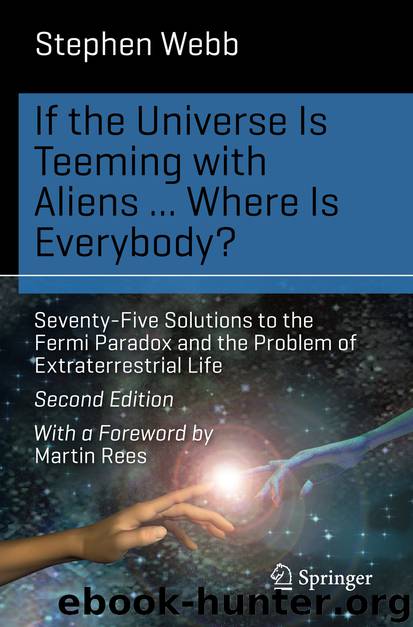If the Universe Is Teeming with Aliens ... WHERE IS EVERYBODY? by Stephen Webb

Author:Stephen Webb
Language: eng
Format: epub, mobi
Publisher: Springer International Publishing, Cham
Solution 49 The Migration Hypothesis
Nothing burns like the cold.
George R. R. Martin, A Game of Thrones
In recent years the Serbian astronomer Milan Ćirković has thought more deeply than most about the Fermi paradox. It’s interesting, then, that Ćirković can take the same starting points as an author such as Clément Vidal and yet arrive at a quite different conclusion regarding the development of advanced technological civilizations—and a slightly different resolution to the paradox.
In a paper co-written with the futurologist Robert Bradbury, Ćirković argued that intelligent life will arise at various points in the Galaxy and, if such life survives all the natural and self-initiated disasters that fate throws at it, will inevitably pursue a trajectory that leads to postbiological evolution. Ćirković and Bradbury agree with Vidal, Smart, Dick and others that the emergence of artificial intelligence and the ability to manipulate matter on the nanoscale will lead to spatially compact civilizations. They disagree, however, about the likely physical location of these civilizations.
If one accepts that proposition that technologically advanced beings will be motivated by the processing of information—which is essentially a variant of Dick’s Intelligence Principle; whether these beings “have” computers or “are” computers doesn’t really matter—then one can ask where such processing will occur most efficiently. Ćirković and Bradbury point out that heat is the enemy of computation. While many of the challenges facing present-day computers will eventually be overcome by employing different designs or fancier technology, the issue of heat dissipation arises directly from the laws of thermodynamics. The problem of heat dissipation will restrict the computational processes of even the most advanced technological civilizations—assuming they are bound by the laws of physics—and, since information processing is assumed to be the guiding motivation of such civilizations, Ćirković and Bradbury argue that this restriction will dominate their policies. (Precisely what sort of computation these civilizations would perform is unknown, but the assumption is that they’ll prioritize the ability to process information over the physical colonization of the Galaxy.)
The maximum number of bits one can process using a given amount of energy is inversely proportional to the temperature of the processor. It follows that as one decreases the temperature of the heat reservoir in contact with the processor, computation becomes more efficient. The limiting temperature is that of the universe itself, the temperature of the cosmic microwave background: 2.7 K. (It’s possible to cool a processor below this temperature, but the efficiency gains are offset by the energy required to do the cooling.) Radiation from stars causes the inner reaches of a galaxy to be rather hotter than the microwave background temperature; the limiting temperature is approached asymptotically as one moves away from the center. From a thermodynamic point of view, therefore, the best places to carry out computation are in the cold outer regions of a galaxy. Interestingly, these are also the places where various astrophysical phenomena that are inimical to life—high-energy events such as supernovae—are less likely to occur. All this leads Ćirković and Bradbury to posit the
Download
If the Universe Is Teeming with Aliens ... WHERE IS EVERYBODY? by Stephen Webb.mobi
This site does not store any files on its server. We only index and link to content provided by other sites. Please contact the content providers to delete copyright contents if any and email us, we'll remove relevant links or contents immediately.
| Aeronautics & Astronautics | Astronomy |
| Astrophysics & Space Science | Comets, Meteors & Asteroids |
| Cosmology | Mars |
| Solar System | Star-Gazing |
| Telescopes | UFOs |
Tools of Titans by Timothy Ferriss(8363)
Turbulence by E. J. Noyes(8040)
Secrets of Antigravity Propulsion: Tesla, UFOs, and Classified Aerospace Technology by Ph.D. Paul A. Laviolette(5364)
Astrophysics for People in a Hurry by Neil DeGrasse Tyson(5178)
Room 212 by Kate Stewart(5102)
Design of Trajectory Optimization Approach for Space Maneuver Vehicle Skip Entry Problems by Runqi Chai & Al Savvaris & Antonios Tsourdos & Senchun Chai(5062)
Pale Blue Dot by Carl Sagan(4996)
The David Icke Guide to the Global Conspiracy (and how to end it) by David Icke(4699)
A Journey Through Divination and Astronomy by Publishing Pottermore(4377)
Goodbye Paradise(3798)
Apollo 8 by Jeffrey Kluger(3702)
COSMOS by Carl Sagan(3617)
The Five People You Meet in Heaven by Mitch Albom(3550)
Losing the Nobel Prize by Brian Keating(3534)
How to Read Water: Clues and Patterns from Puddles to the Sea (Natural Navigation) by Tristan Gooley(3458)
Brief Answers to the Big Questions by Stephen Hawking(3425)
How to Read Nature by Tristan Gooley(3332)
The Order of Time by Carlo Rovelli(3188)
A Brief History of Time by Stephen Hawking(3022)
